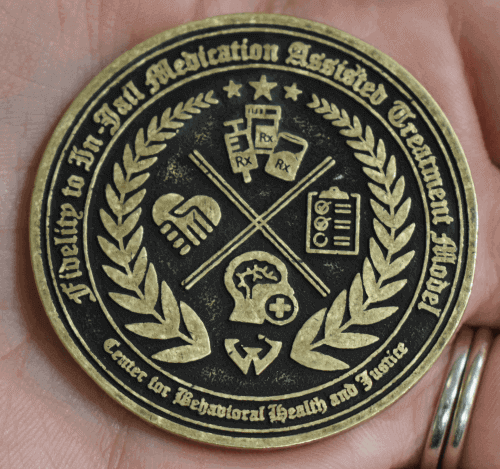Monroe County Jail achieves gold standard of medical care for opioid addiction
Earlier this year, the Monroe County Sheriff’s Office became the first in Michigan to be certified for making medication and treatment available to individuals with opioid use disorder (OUD) incarcerated inside the jail. Throughout the COVID-19 pandemic, county leaders across jail and healthcare systems continued their partnerships to reach an evidence-based standard of care for those seeking recovery from OUD inside the facility.
 The certification, awarded by the Center for Behavioral Health and Justice at the Wayne State University School of Social Work, is granted to counties who successfully implement all elements of the In-Jail Medication Assisted Treatment model, which includes: 1) Administration of a standard screening for opioid use disorder implemented at jail booking, 2) Availability of all three Food and Drug Administration (FDA) approved medications for OUD (MOUD), 3) Concurrent psychosocial services for detainees receiving MOUD, and 4) Comprehensive discharge planning that includes assistance with Medicaid reactivation, a naloxone kit at release, and coordination with a community-based MOUD provider.
The certification, awarded by the Center for Behavioral Health and Justice at the Wayne State University School of Social Work, is granted to counties who successfully implement all elements of the In-Jail Medication Assisted Treatment model, which includes: 1) Administration of a standard screening for opioid use disorder implemented at jail booking, 2) Availability of all three Food and Drug Administration (FDA) approved medications for OUD (MOUD), 3) Concurrent psychosocial services for detainees receiving MOUD, and 4) Comprehensive discharge planning that includes assistance with Medicaid reactivation, a naloxone kit at release, and coordination with a community-based MOUD provider.
People with substance use disorders often come into contact with the criminal/legal system, and those with OUD are up to 120 times more likely to have a fatal overdose following release from incarceration compared to the general population. Engaging people in treatment prior to release reduces their chance of fatal overdose, and although treating OUD with medication is documented in research as the gold standard of care for this medical condition, less than 1% of jails and prisons across the country make MOUD available to detainees.
Despite the COVID-19 pandemic, the Monroe County Sheriff’s Office made it a priority to implement this new program in April 2020 and has demonstrated it is possible to respond to multiple health crises – the COVID-19 pandemic and the overdose epidemic – concurrently. “It’s the right thing to do,” said Monroe County Sheriff Troy Goodnough. “We find that a portion of individuals who suffer from drug addiction suffer from co-occurring mental health disorders. We need to give them the opportunity to be productive members of society.”

Monroe County stakeholders have demonstrated leadership in this area, not just in Michigan, but nationwide. With support from the Michigan Health Endowment Fund, county stakeholders – including the Monroe County Sheriff’s Office, Monroe Community Mental Health Authority, Advanced Correctional Healthcare, Passion of Mind Healing Center, and Therapeutics – worked collaboratively across corrections, medical, and behavioral health disciplines to develop and implement a robust medication assisted treatment program in the Monroe County Jail. “Without these partnerships, the program would undoubtedly fail,” said Sheriff Goodnough. 
“Monroe county leaders came together as champions of health, wellness and safety. They have made the Health Fund’s vision a reality by significantly improving the treatment, prevention, and early intervention ecosystem,” said Lynda Zeller, Senior Program Officer for Behavioral Health at the Michigan Health Endowment Fund. “It took all hands on deck, and they did exactly that, consistently and in spite of many challenges and barriers – not to mention a pandemic.”
In April 2021, the CBHJ made a presentation to the Monroe County Board of Commissioners, and in August 2021, CBHJ staff presented certification awards to involved stakeholders to recognize this tremendous accomplishment.
The Monroe County Jail has been exemplary in its screening for opioid use disorders when individuals are booked into the facility, achieving a nearly 100% screening rate with the Rapid Opioid Dependence Screen (RODS) being implemented directly into the electronic jail records management system. Approximately 19% of people screened are at risk for opioid use disorder and are referred to the in-jail medical team and community-based MOUD provider daily. Of those individuals who meet criteria for opioid use disorder and demonstrate medical need to receive MOUD treatment, 96 individuals were enrolled during the program’s first year.
About the Center for Behavioral Health and Justice: The Wayne State University School of Social Work Center for Behavioral Health and envisions communities in which research, data, and best practices are used by multiple stakeholders to enhance the optimal well-being of individuals with mental illness and/or substance use disorders who come into contact with the criminal/legal system. For more information about the CBHJ’s MOUD in Jail model or our key initiatives, please visit our website or contact us.
About the Michigan Health Endowment Fund: The Michigan Health Endowment Fund is a philanthropic foundation that works to improve the health and wellness of Michigan residents while reducing healthcare costs. Learn more